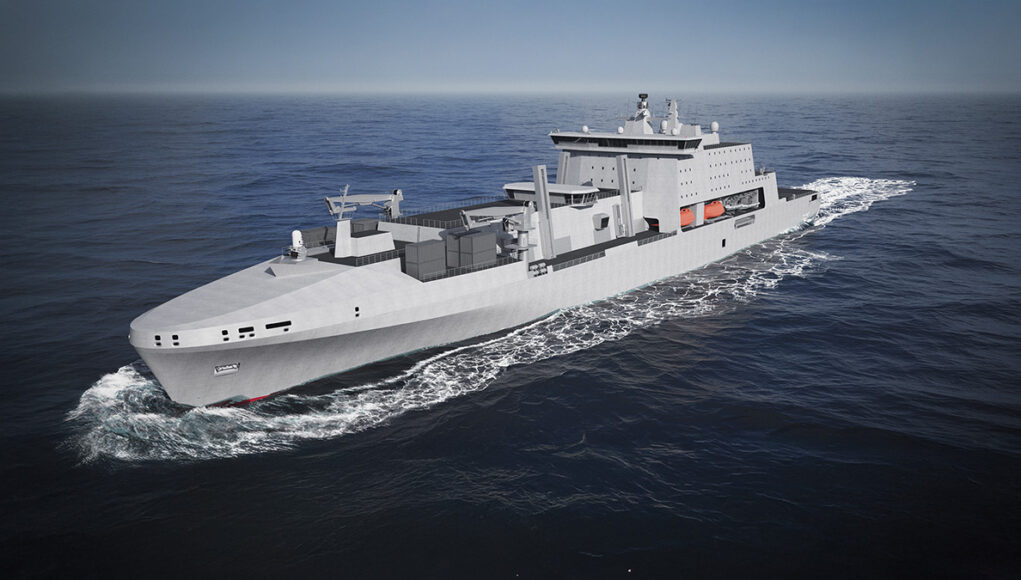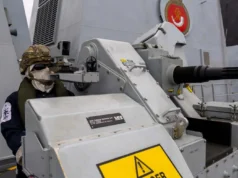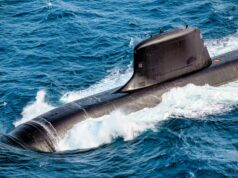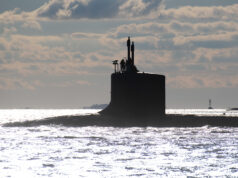The Ministry of Defence, in a letter from Defence Minister Luke Pollard to Defence Committee chair Tan Dhesi MP, says UK labour hours in the Fleet Solid Support Ship (FSS) programme will increase under what Pollard describes as “this new approach,” following the decision to shift part of ship-1 fabrication to Spain to avoid schedule slippage after Harland and Wolff’s financial collapse.
In the detailed annex Pollard provided to the Committee, he states that “there are no contractual obligations for UK workshare,” noting that the contract agreed under the previous government was based on Navantia UK’s proposed build strategy, which was assessed as delivering “the best achievable social value benefits and UK content, balanced against cost, schedule and capability.”
Pollard highlights that the contract contains “a social value commitment,” requiring skills development, apprenticeships and investment across UK supply chains.
He confirms that recapitalisation of the Belfast yard is a contractual requirement, adding that “the totality of the civil engineering work… [is] delivered through UK suppliers” and expected to generate “long-term benefits to the local community… in terms of supply chains, employment and community engagement.”
On ship-1, Pollard’s annex explains that “it is necessary for more fabrication work to be done in Spain on ship 1,” due to the pause in Belfast recapitalisation during Harland and Wolff’s financial distress. He writes that the shift was made “to minimise the impact on ship 1 delivery dates,” with responsibility “shared between Navantia UK and the MOD.”
He also stresses that the change does not reduce domestic output overall. The annex states: “The reduction in UK work on ship 1 will be offset by increased UK work on ships 2 and 3, ensuring the overall UK workshare is maintained. In fact, on current estimates, UK labour hours are increased slightly in this new approach.” Pollard notes that Navantia UK has “further invested in an 85 metre barge… built in their Methil yard in Scotland.”
Pollard writes that recapitalisation at Belfast restarted in spring 2025 following Navantia UK’s acquisition of the H&W yards, and that production readiness will be demonstrated through “the manufacture of a test module in Belfast,” overseen jointly by the MOD and Navantia.
On costs, Pollard states that transferring some early work to Spain “does not result in additional costs and delivers the ships more quickly than would have been the case if this work had remained in Belfast.” He confirms that the Appledore workload, including bow sections for all three ships, “remains unchanged.”
Regarding industrial impact, Pollard’s annex says: “The overall workload and workforce for UK shipyards… is expected to be maintained or increased over the life of the programme,” pointing to continued apprentice recruitment at both Appledore and Belfast. He argues that Navantia UK’s takeover of H&W has “allowed a renewed commitment to suppliers.”
On oversight of Navantia’s restructuring decisions, Pollard writes: “As the Prime Contractor, it is the responsibility of Navantia UK to manage their suppliers… within a fixed/firm price to deliver the three FSS ships.” The contract includes “remedies, including those linked to delivery performance,” and he stresses that “any material changes to the build strategy require prior engagement.”
Pollard concludes that the programme continues to meet its strategic intent: “The FSS programme is great news for UK suppliers and shipbuilding and the Government is committed to delivering a thriving shipbuilding sector across the UK.”














Ooh, fancy new homepage layout.
Is that so that we can see more of the recent articles, George?
Given that Fort Victoria seems to be defunct, anything that expedites the delivery of the first FSS has to be welcomed. Indeed, as the ships projected in-service date is still at least 6 years away (2031), the emergency purchase and conversion of a civilian ship as a stop-gap solid stores replenishment vessel seems essential.
Yes it’s possible but I’d probably advise against it go down a different route. The RCN had a gap between its last FSS and the new ones that are being built entering service, so they decided to convert a 2010 German built container ship as a stop gap. It cost $20,000,000 to buy and then $700,000 to convert and to design and carry out the conversion took 3 years, however the ship isn’t built to military specs, has zero armament and inadequate damage control compared to a purpose built military vessel so no use anywhere near a combat zone.
IMHO there is a better option, speak to the RNZN about acquiring the design for their Medium sized FSS HMNS AOTEAROA and get Hyundai to build it, they did it for around half the cost of the Canadian conversion and took just 2 years from start to commissioning.
Maybe she is a bit small for a Carrier but is comparable to Norways Maude, best bit is post FSS arriving she is Polar 6 class and would be handy for supporting other ships.
It’s actually not a bad idea on the AOTEAROA.. but stop gap could just as easily be a wave class.. we have two of the things that the RN are planning to turn to razor blades.. they can carry 18,000CU feet of dry stores and 8 refrigeratated 20foot containers for food….
The waves are completely unsuitable, solid stores is more than just having a theoretical amount of empty space.
They are no more or less suitable than the AOTEAROA.. infact they are just as good at managing solid stores.. the waves were designed to do solid stores RAS.
They don’t even have a solid RAS rig. And that doesn’t solve the crewing issue
As far as I’m aware like every modern fleet oiler they have movable high point heavy jackstay to allow limited transfer of solid stores or lubrication oil drums…so yep the can do solid RAS.. not to the same extent as a solid stores ship buts it’s there none the less..
And….. crew can be found trained and recruited if the will, plan and money is there.
It doesn’t, neither do the Tide class
Yes they do
If that was the case then wed be using the tides as a substitute for solid stores as you suggest, but it is clearly completely insufficient.
She will end up as the permenant FSS if that was done.
Yes we needed these 5 years or more ago.
Where exactly are you getting a vessel suitable as a stop gap, and who is crewing it.
It’s a ship for the royal navy it should be entirely British built from entirely British materials. If that means reopening a ship yard or expanding one, reopening steel mills or even coal mines or iron ore mines then so be it, the results will help the UK grow and the ability to build ships is integral to surviving a war against us. Time to stop listening g to civil servants that hate.tbe UK and start doing the obviously right things
So you want to wait 20 years to rebuild all those industries then?
We don’t have to, go through your history. It doesn’t take anything like that long to build a factory. The rolls Royce plant near Glasgow went from green field to first completed engine in under a year. It honestly doesn’t take more than a couple of years top to build and equip a factory if the will is there (rather than civil servants finding excuses for another inquiry or planning debate)
Great build a factory, how long will it take to train or even attract the workers
Frankly not long.at the moment about 2% of the UK working age population is not working at all. Of the rest a large mnumber are only working part time or zero hours. Of the rest a good number are civil servants shuffling paper and making peoples live hell. Of the rest most are accountants. That means we have millions of people who could either use a job or a real job. Now you will continue to have difficulties if you continue to want to pay engineers and workers less than a loaf of bread a year so the top management can have half a dozen super ships and planes. Its not difficult to attract workers, decent conditions, decent pay. Salaries in IT today on offer over multiple adverts, all screwaming for experience, dedication and knowledge, none paying what I was earning in 1994.
Stop listening to the BBC and start thinking, we are the nation that has stood up and managed every time we need to, now we need to, People like you, those who wont believe, wont try, just throw up their hands and go we cant are a major part of the problems in the UK
I’m literally getting my qualifications and signing up to the navy so bog off.
You just won’t see the reality of the situation that most people aren’t interested in manual labour jobs anymore if they can avoid it or being away from home on a floating bathtub
Thank you for joining, people who do are an asset to the country with pride in themselves. I am sure there are many who want to avoid at work and I believe we make it too profitable to do so, but there are people with pride in themselves that do want to work and we sadly are passing the opportunity for them to work abroad. It can not be that people in the Netherlands, Germany, France, Italy and others want to work and somehow we are uniquely lazy in the UK
“the best achievable social value benefits and UK content, balanced against cost, schedule and capability” This man spouts verbal garbage at every attempt. Just get the bloody things built and then figure out how to crew them. Pollard never visits TV studios I notice, works from home by th look of the rubbish quality picture when he is interviewed. He couldn’t answer the big question today: “Is Britain safe?”